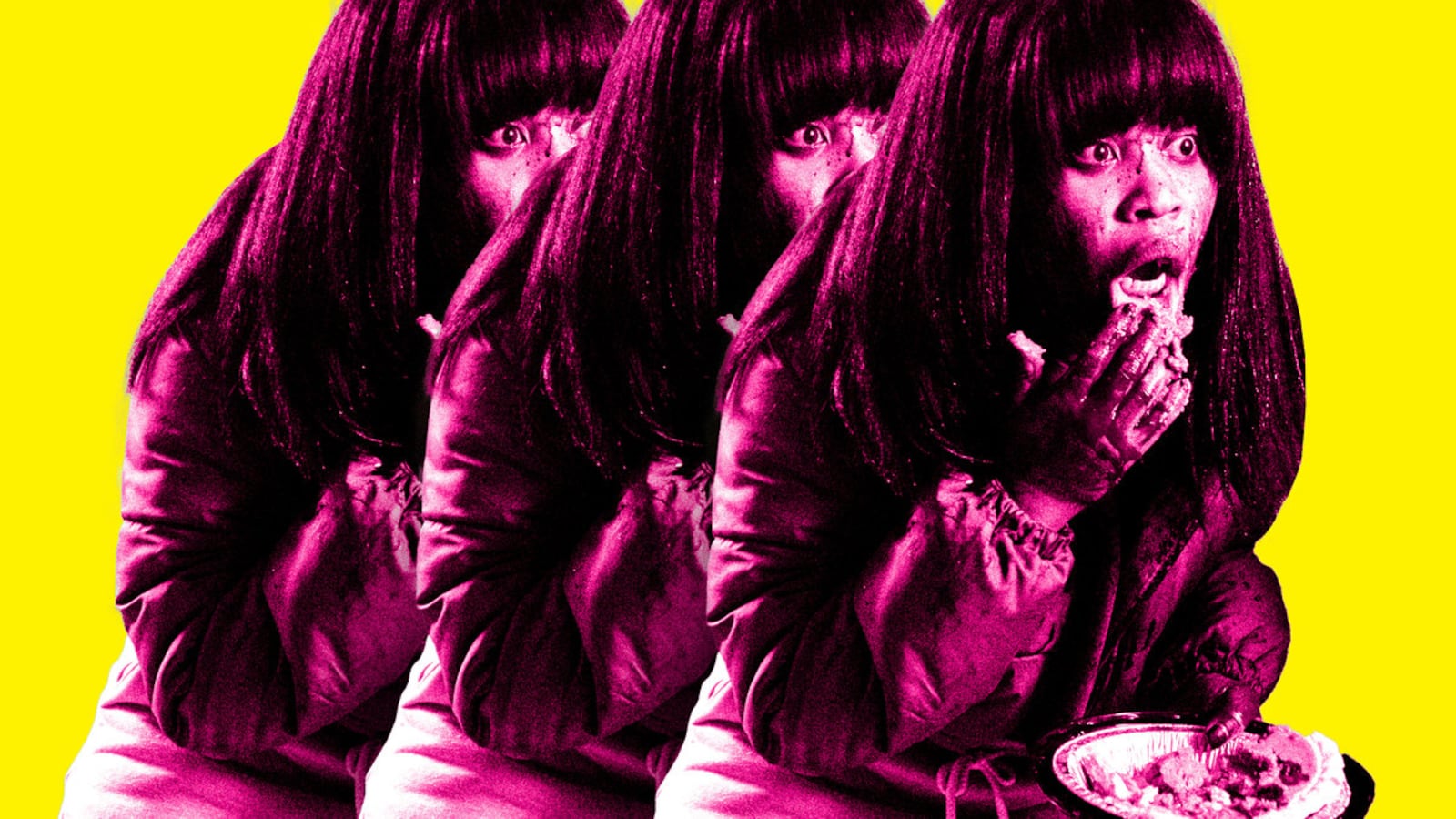By now, you’ve probably heard about the new TV series Swarm that’s about Beyoncé fans but not about Beyoncé fans. Donald Glover and Janine Nabers’ new Prime Video show, out today, follows a troubled young woman (Dominique Fishback), whose obsession with a pop star resembling the “Crazy In Love” singer takes her down a disturbing path.
Such an offhand description of a show would typically sound reductive. But Swarm is so flagrantly conceived around Beyoncé’s cultish fan base (known as the BeyHive), from its title to several other on-the-nose references, that it feels appropriate. At the same time, Swarm’s grabby premise feels partially designed as a decoy. In fact, it’s the tension between the show’s satirical elements and what it tries to achieve outside of them that makes it so engaging.
Throughout the show’s seven episodes, I kept wondering whether I was more impressed by Swarm’s ruthless depiction of stan culture and the novelty of a Black, female antihero than by the actual story at its core. Thankfully, as the series progresses, it reveals itself to be much more than a stylized parody centered around what many might consider obvious internet bait. Instead, it’s a provocative and surprisingly humanistic portrait of the people who get left behind.
Warning: Spoilers for Swarm below.

While Swarm features a number of supporting players and guest stars, the show is essentially a one-woman act, due to the magnitude of Fishback’s performance. The actress plays Dre, a socially awkward, twentysomething woman with few relationships outside of her sister Marissa (Chloe Bailey) and her favorite artist Ni’Jah (Nirine S. Brown)—the latter being parasocial, of course. Dre and Marissa have the sort of darkly co-dependent sisterhood that brings to mind Shelley Duvall and Sissy Spacek in Robert Altman’s film 3 Women. Their bond is partially built on their shared affection for Ni’Jah—although Dre’s is a lot more intense.
We understand the urgency of their relationship when Marissa is dumped by her freeloading boyfriend Khalid (played to fuckboy perfection by Damson Idris) and commits suicide when she can’t reach Dre over the phone. Elsewhere in the pilot, we learn that Dre is not just estranged but seemingly despised by her family, when she attempts to attend her sister’s funeral. Notably, Marissa’s death leads Dre to commit the first of several murders throughout the series, first as an act of revenge for her sister and later on in the name of Ni’Jah—or maybe someone else.
The 30-minute premiere alone, particularly its last scene, will leave you feeling a bit concussed. The rest of the series, though, unfolds in a manner and pace similar to Glover and Nabers’ previous collaboration Atlanta, with bizarre excursions and darkly funny encounters with curious strangers. In Episode 4, Dre finds herself at a wellness retreat (read: cult) with a bunch of granola white women, who follow a ring leader played by Billie Eilish. The episode is a familiar, somewhat tired takedown of liberal white women, not unlike certain episodes of Atlanta. Another episode borrows an actual Beyoncé headline as its primary gag. Still, the writers manage to keep their primary focus on Dre in the midst of other shenanigans, feeding viewers more confusing details that you hope will eventually make sense. (Thankfully, they do.)
The last three episodes are where the series ultimately hits its stride. Episode 5 manages to be more unsettling and head-scratching than any of the violent and erratic behavior previously witnessed. When Dre returns to her childhood home for temporary refuge, she’s anything but welcome there by her parents. The dynamic between her and her father (played by an excellent Leon Robinson) presents more questions than answers—although the extent of Dre’s loneliness is also thrown into stark relief. And in case you think the writers are going to easily unpack everything you just saw, you have to sit through a true-crime mockumentary set in a different universe in the following episode to figure it out.
As chaotic and disorienting as Swarm may feel, it fortunately doesn’t abandon any of the plot points or ideas it sets forth. The finale, which initially feels more like a detour than a conclusion, manages to tie up most of the show’s loose ends—although not in a way that undermines its ambiguity.

When discussing Swarm with The Daily Beast’s Obsessed ahead of its premiere, Nabers said that she was primarily concerned with evoking feelings amongst viewers. The writing and trajectory of Dre’s life after her sister’s death certainly facilitates that, but it’s really Fishback’s deft performance that does the job. Watching the actress, who co-starred in Oscar-winning Judas and the Black Messiah and HBO’s now-canceled The Deuce, embody Dre is like watching someone complete an emotional obstacle course. In one moment, Dre emits a level of awkwardness that elicits a laugh. And in another, often during the same scene, her wounds are on full display, making viewers feel complicit in the loneliness and marginalization she experiences.
Beneath the Beyoncé of it all, Swarm is ultimately a story about grief and isolation. It’s a popular assumption that anyone who spends hours of their life obsessing over someone they’ll never know is experiencing some sort of emptiness. Culturally speaking, though, these feelings are rarely ever interrogated. However, Swarm forces you to stare in the face of these often anonymous people—even if it’s a dramatized version of them—and experience all the intensity of their inner lives. The end result is horrifying, hysterical, and refreshingly empathetic.






